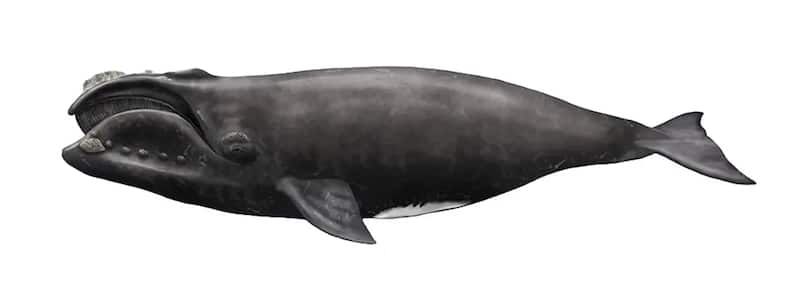This post was originally published on Eco Watch
For the first time in over a century, a North Atlantic right whale — a critically endangered species with only about 360 individuals remaining — has been seen off the Irish coast.
Adrian Maguire, on vacation from Northern Ireland’s County Tyrone, saw the whale’s enormous figure as he fished for mackerel in a boat with his wife and a couple of friends, reported The Guardian.
“I just looked in amazement at the size of it,” Maguire said. “I’ve never experienced that in my life.”
Macguire described letting the boat drift as they watched for about an hour while the whale swam and surfaced in McSwynes Bay off Ireland’s northwest coast.
“The sound of the blowing – it’s great to hear that in real life,” Maguire said, as The Guardian reported.
Conor Ryan, a Scottish Association for Marine Science research fellow, said it was the first North Atlantic right whale sighting off the coast of Ireland in 114 years.
“I was very sceptical at first because it’s such an unbelievable occurrence,” Ryan said.
North Atlantic right whales — which can grow to more than 52 feet long — are normally found off North America’s east coast.
Photos taken by Maguire’s party left Ryan and colleagues unsure of the species of whale at first, but after watching video footage, they knew it was a North Atlantic right whale from the cetacean’s crusty white callosities — skin that had been damaged by whale lice.
“There’s no other whale in the North Atlantic with that,” Ryan explained, adding that sightings of the species in Europe are extremely unusual. The majestic whales were once commonly found in European waters, but whaling decimated their populations centuries ago.
The sighting was confirmed as a North Atlantic right whale by the Irish Whale and Dolphin Group (IWDG), who said there aren’t many whales who frequent Irish waters.
“The thing about whales in Ireland, in common with most places around the globe, is that there will only be a relatively short list of ‘usual suspects’ in any one area,” a press release from IWDG said. “[I]n Irish coastal waters, the only whale that routinely lifts its tail clear of the water before a deep dive, is the humpback whale, and this clearly was no humpback. So not only could we rule out this species, but along with the humpback, we could eliminate minke, fin and sei whales, who simply don’t tail fluke.”
Illustration of a North Atlantic right whale. William Helps / Irish Whale and Dolphin Group
IWDG sightings officer Pádraig Whooley contacted the New England Aquarium in Boston, which keeps track of known individuals of the species, reported The Guardian. Whooley said the aquarium was in the process of trying to identify which particular whale was observed off County Donegal from footage of its markings.
According to IWDG, the survival outlook for this critically endangered species is fragile, as each year entanglement in fishing gear and ship strikes kill individuals from their dwindling population.
Ryan said the current rate of North Atlantic Right whale deaths is too high for them to recover, The Guardian reported.
However, while Ryan didn’t anticipate the species would “make a comeback” in Irish waters in the near future, he said the sighting was “a glimmer of hope.”
IWDG advised caution for anyone going in search of the rare visitor.
“As always we ask wildlife and whale enthusiasts who’d like to visit the area with a view to seeing this animal to look for it and watch it from the shore using optics. North Atlantic Right whales are most susceptible to ship strike and even a collision with a small vessel can have fatal consequences for the individual and a significant impact at population level. There is an enormous onus on us all to ensure this whale remains as long as it needs in Donegal bay, where it’s most likely feeding on tiny copepods, without having to run the gauntlet of small craft and sightseers,” IWDG said in the press release. “This is our chance to help a population of whales on the very brink. Please give it space.”
The post North Atlantic Right Whale Spotted Off Irish Coast for First Time in More Than a Century appeared first on EcoWatch.

